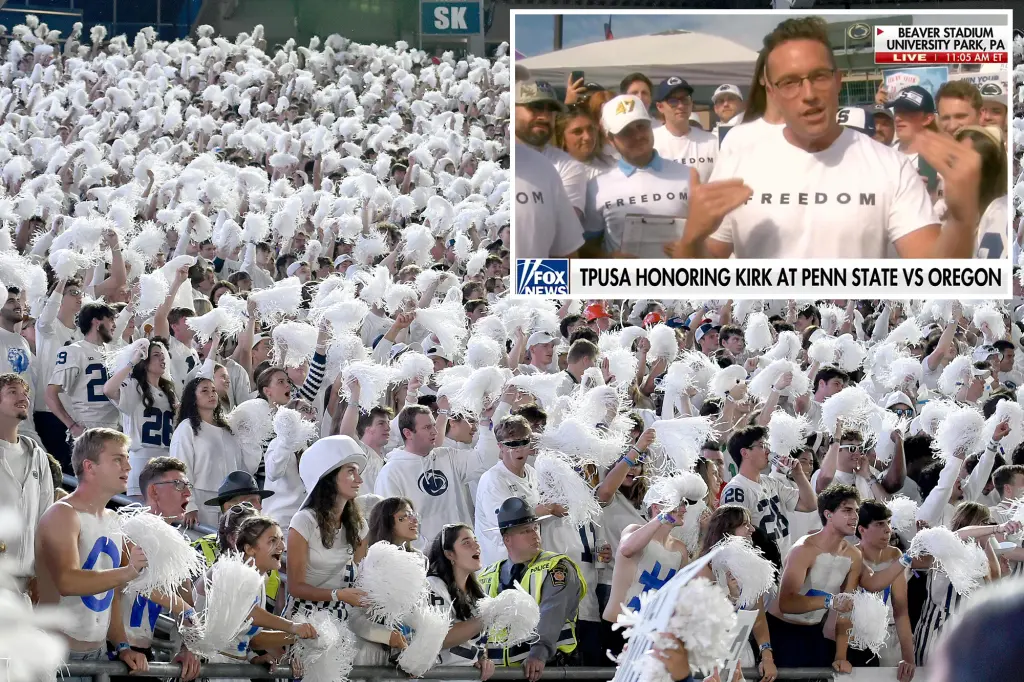Penn State Football Game Highlights Unity Amid Tragedy
In a poignant display of solidarity following the tragic death of conservative commentator Charlie Kirk, thousands of Penn State football fans donned “FREEDOM” T-shirts during Saturday’s highly anticipated game against Oregon. The scene created a striking visual as images of students wearing the shirts—identical to the one Kirk wore when he was fatally shot on September 10 at a Utah Valley University event—spread rapidly across social media platforms. The shirts were distributed through an initiative organized by conservative influencer Benny Johnson, who worked with Turning Point USA (TPUSA) to give away 5,000 shirts to fans in the Beaver Stadium parking lot before kickoff. Johnson shared footage of the massive lines that formed, with crowds eventually breaking into spontaneous “USA!” chants, creating an atmosphere that blended sports enthusiasm with memorial tribute.
The gesture took on additional meaning given that Oregon—which ultimately won the nail-biting contest 30-24 in overtime—was reportedly Kirk’s favorite college football team. The game itself proved dramatic, with Oregon defensive back Dylan Thieneman sealing the victory with a crucial interception in overtime, creating an unusual situation where Kirk’s preferred team triumphed in front of thousands wearing shirts commemorating him. Johnson framed the shirt distribution as continuing Kirk’s mission, explaining on “Will Cain Country” that “In the vein, and in honor of Charlie Kirk, we are going to fight cultural battles, and we are going to win them in an arena that Charlie loved so very much—college football.” The shirts were particularly visible during Penn State’s traditional “whiteout” game, where fans typically dress entirely in white.
Kirk’s death at age 31 shocked the nation, leaving behind a wife and two young children. The assassination of the TPUSA founder has reverberated through conservative circles and beyond, with many seeking ways to honor his memory and continue his advocacy. Johnson articulated this sentiment when announcing the T-shirt initiative, noting that Kirk had planned to attend this specific game and had connections to both teams—his personal fandom of Oregon and his previous speaking engagements at Penn State. The stadium thus became a venue not just for athletic competition but for a public demonstration of support for Kirk’s family and the values he championed throughout his career as a political commentator and organization leader.
The game represented just one of several tributes to Kirk that have occurred at major football events since his death earlier in September. The involvement of Oregon added another layer of significance, as Oregon head coach Dan Lanning had previously addressed Kirk’s assassination following his team’s victory over Northwestern. In his remarks, Lanning offered heartfelt condolences to Kirk’s family, saying, “I hurt for his wife, Erika, and their kids. That sort of evil should never exist in our country, and that’s what it is—evil.” Lanning’s comments reflected the shock many felt at the targeted killing of a public figure, regardless of political affiliation, and the broader concern about violence in American society.
Lanning’s response went beyond mere condolences, however, as he used the moment to offer a broader perspective on unity amid difference. The coach suggested that American society might learn from his diverse locker room, observing, “You walk in that locker room, you’ve got guys of different races, guys of different backgrounds, different religions and you got a team that loves each other. Tons of differences. Where they come from, what they deal with and, ultimately, you’ve got a team that loves each other, and I think we’re missing some of that in our country.” His comments resonated with many who saw the football field—and sports more generally—as a potential model for cooperation across dividing lines, where common purpose can transcend background differences.
As the game concluded with Oregon’s victory, the image of thousands of Penn State fans in “FREEDOM” shirts watching Kirk’s favorite team triumph created a memorable tableau that transcended the usual rivalries of college football. The event demonstrated how sports venues have increasingly become spaces where Americans process national tragedies and express collective values. While the primary purpose remained athletic competition, the presence of the shirts transformed the stadium into a temporary memorial that acknowledged the shock of Kirk’s assassination while celebrating the freedoms he advocated for. As players from both teams competed fiercely on the field, the stands served as a reminder of how public figures like Kirk can leave legacies that extend far beyond their primary spheres of influence, touching communities they may never have directly engaged with during their lifetimes.


